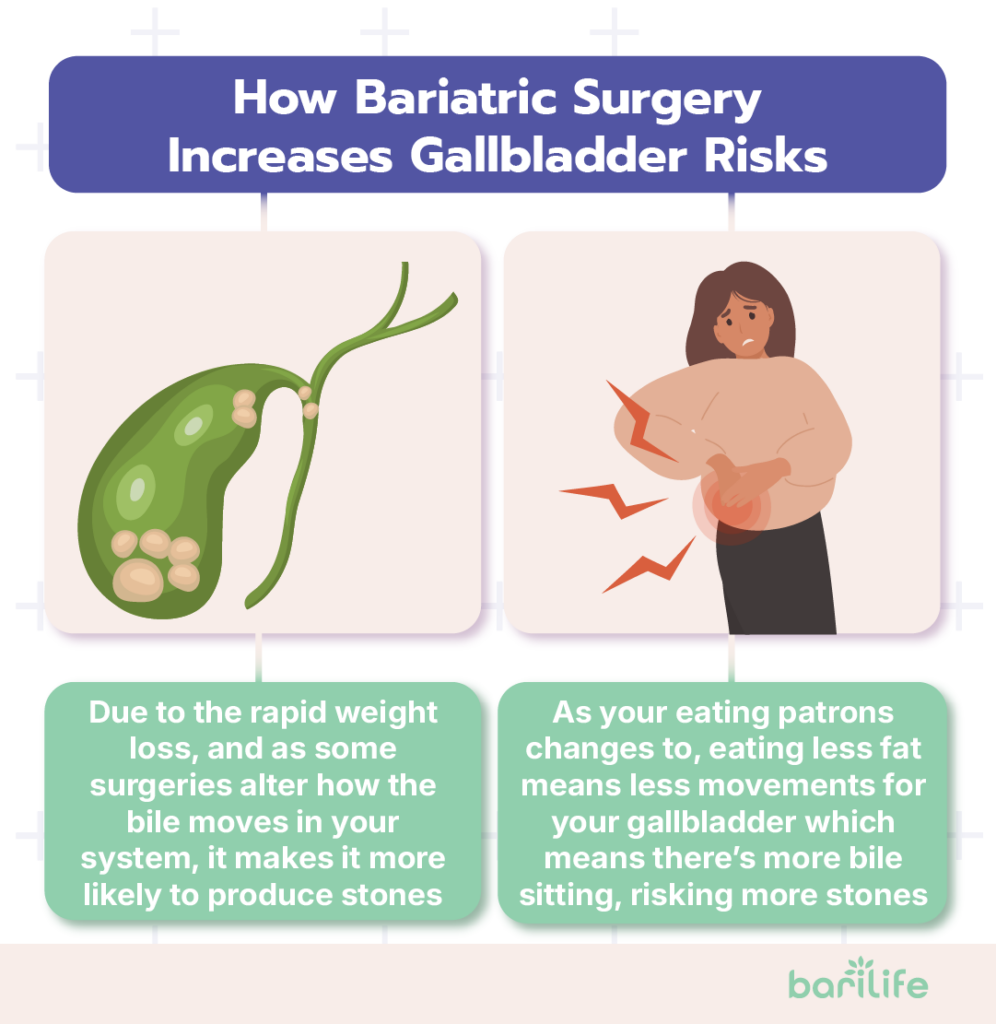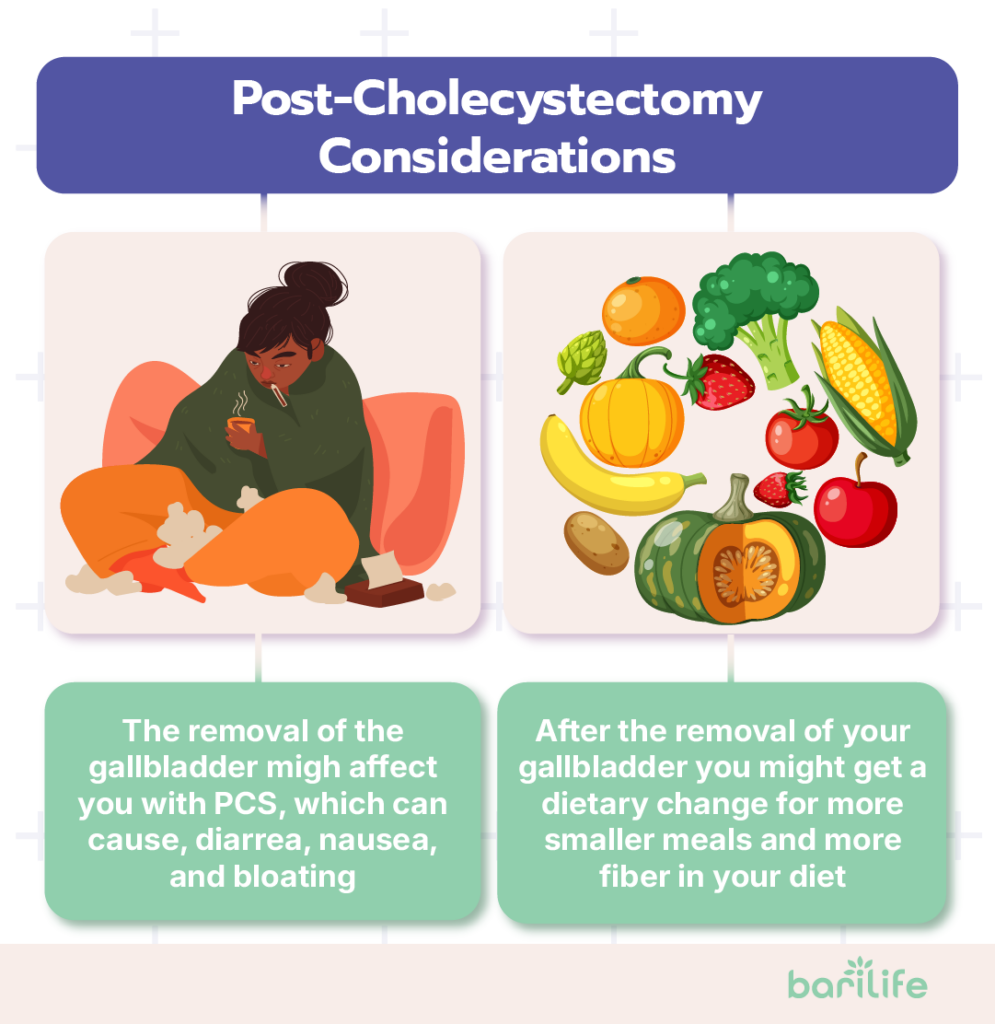Key Takeaways:
- Up to 35% of bariatric surgery patients develop gallstones after their procedure due to rapid weight loss, which increases cholesterol in bile.
- Altered bile acid metabolism and reduced gallbladder motility after surgery create ideal conditions for gallstone formation.
- Preventive measures include medication (ursodiol), gradual weight loss when possible, and in some high-risk cases, preventive gallbladder removal during bariatric surgery.
You've probably thought a lot about how bariatric surgery might affect your stomach and weight loss journey. But there's another small organ that deserves your attention, too—your gallbladder. Many people are surprised to learn that there's a significant connection between bariatric surgery and gallbladder health.
We'll explore this connection, why it matters for your health, and what you can do to protect yourself from potential complications.
[/box]
What are the Gallbladder’s and Bile’s Functions?

Your gallbladder is that small, pear-shaped organ that's right beneath your liver on the right side of your abdomen. Though small (about the size of a golf ball when full), it plays a vital role in your digestive system.
Think of your gallbladder as a storage tank for bile, a digestive fluid produced by your liver. Bile is essential for breaking down the fats you eat. Without it, you couldn't properly digest or absorb fatty foods.
When you eat, especially foods containing fat, your gallbladder contracts and squeezes bile through small tubes called bile ducts into your small intestine. There, the bile works like dish soap on greasy dishes—it breaks down large fat globules into small particles that your body can absorb.
Bile itself is a complex fluid comprising several ingredients: water, bile salts, cholesterol, bilirubin, and phospholipids. The balance of these components is important—when they get out of balance, problems like gallstones can develop.
When everything in your body is balanced, this whole system works smoothly until something disrupts it, which is exactly what can happen after bariatric surgery.
Types of Bariatric Surgery and Their Effects on the Gallbladder
There are several types of bariatric procedures, and each can impact your gallbladder differently. Some of these also have implications for other conditions like PCOS and bariatric surgery, bariatric surgery for GERD, and bariatric surgery for hypertension.
For example, gastric bypass not only contributes to gallstone formation but is also studied in the context of bariatric surgery and diabetes, and whether does bariatric surgery cure diabetes in some patients with type 2 diabetes.
- Gastric bypass (Roux-en-Y): Part of your stomach is separated to create a smaller pouch, and your small intestine is rerouted to link to this pouch.
- Sleeve gastrectomy: About 80% of your stomach is removed, leaving a banana-shaped "sleeve."
- Adjustable gastric banding: An inflatable band is placed around the top of your stomach, which creates a small pouch.
The connection between the gallbladder and bariatric surgery comes down primarily to one factor: rapid weight loss.

When you lose weight quickly, as most people do after bariatric surgery, your liver secretes more cholesterol into the bile. At the same time, your gallbladder may not contract as efficiently as it used to. This combination creates the perfect environment for gallstones to form.
Studies show that up to 35% of bariatric surgery patients develop gallstones in the months following their procedure. That's significantly higher than the general population. Some patients may develop "sludge" in their gallbladder before actual stones form, which can also cause problems.
Different procedures carry different risks. For example, procedures that cause malabsorption (like gastric bypass) may have higher gallstone formation rates than restrictive procedures (like gastric banding). This is because they change how bile acids circulate in your digestive system.
How Bariatric Surgery Increases Gallbladder Risks
Let's dive deeper into why bariatric surgery increases your risk of gallbladder problems. It's not just one factor, but several that come together:
Rapid Weight Loss
After bariatric surgery, most people lose weight quickly—often 50% or more of their excess weight within the first year. While this is fantastic for your overall health, it's challenging for your gallbladder. When you lose weight rapidly, your liver secretes extra cholesterol into your bile. This excess cholesterol can form crystals, which can eventually become gallstones.
Altered Bile Acid Metabolism
Bariatric procedures, especially those that reroute your intestines, like gastric bypass, change how bile acids move through your digestive system. Typically, bile acids are recycled—they travel through your intestines and then get reabsorbed and sent back to your liver. After a bariatric procedure, this recycling process gets disrupted.
This disruption can result in changes in the composition of your bile, making it more likely to form stones. It can also affect how efficiently your gallbladder contracts, which brings us to the next factor.
Reduced Gallbladder Motility

After weight loss surgery, your eating patterns change dramatically. You eat smaller meals less frequently, and your diet contains much less fat than before. While these changes are good for weight loss, they're not ideal for your gallbladder.
Your gallbladder contracts in response to eating, especially when you consume fat. With less food and fat intake, your gallbladder doesn't contract as frequently or as strongly. This reduced motility means bile sits in your gallbladder longer, giving cholesterol more time to concentrate and form crystals.
Additionally, hormonal changes that occur with weight loss can further reduce gallbladder contractions. It's like a perfect storm for gallstone formation.
Preventing Gallbladder Complications After Bariatric Surgery
The good news is that gallbladder complications after surgery can be managed. There are several strategies that can help reduce your risk of developing problems:
Gradual Weight Loss
Weight loss that's at a rate of 1-2 pounds every week is generally considered safe for your gallbladder, though bariatric patients typically lose faster than this.
Your surgeon and dietitian can help you manage your diet to achieve a healthy balance between good weight loss and gallbladder health.
Medication
Many bariatric programs prescribe medications to help prevent gallstones during the rapid weight loss phase. The most common is ursodeoxycholic acid (often called ursodiol or Actigall), a bile acid supplement that helps keep cholesterol dissolved in bile.
Typically, this medication is prescribed for the first six months after surgery, when weight loss is most rapid and gallstone risk is highest.
Regular Monitoring
After bariatric surgery, you'll have regular follow-up appointments with your healthcare team. These appointments are crucial for monitoring not just your weight loss but also potential complications like gallbladder issues.
Be sure to mention any symptoms that might indicate gallbladder problems, such as pain in your upper right abdomen, particularly after eating.

Dietary Adjustments
While you'll already be following a specific diet after bariatric surgery, certain dietary habits may help reduce gallstone risk:
- Stay hydrated: Drinking adequate water helps maintain proper bile flow.
- Include some healthy fats: High-fat diets aren't recommended after bariatric surgery, but you can include small amounts of healthy fats that stimulate gallbladder contractions.
- Eat regularly: Following your recommended meal schedule helps maintain gallbladder function.
Symptoms and Treatment of Gallbladder Issues After Bariatric Surgery
Even with preventive measures, some people will still develop gallbladder problems after weight loss surgery. Being aware of the signs and symptoms means you can seek treatment promptly.
Common Symptoms
Problems with your gallbladder after bariatric surgery can cause several uncomfortable symptoms, including:
- Pain: Typically experienced in the upper right side of the abdomen, this pain may radiate to your back or right shoulder. It often occurs after eating, especially fatty meals, and can last from 30 minutes to several hours.
- Nausea and vomiting: These symptoms commonly accompany gallbladder pain.
- Digestive issues: You might experience bloating, gas, or indigestion.
- Fever and chills: If an infection develops, you might have a fever and chills
- Jaundice: In severe cases, you may experience yellowing of the skin and eyes
It's worth noting that some people with gallstones experience no symptoms at all. These "silent" stones might only be discovered during routine imaging for other reasons.
Diagnostic Tools
If your doctor suspects gallbladder issues, they'll likely order one or more of these tests:
- Ultrasound: This is usually the first test, as it can effectively visualize gallstones and inflammation.
- HIDA scan: This nuclear medicine test evaluates how well your gallbladder is functioning.
- CT scan or MRI: These might be used if more detailed images are needed.
- Blood tests: These are able to detect signs of infection or inflammation.
Treatment Options

Treatment for gallbladder issues after bariatric surgery depends on the severity of your symptoms and your overall health:
1. Conservative management
For mild symptoms or small gallstones, your doctor might recommend:
- Dietary modifications (further reducing fat intake)
- Pain management
- Monitoring for worsening symptoms
2. Medication
Medications like ursodiol might be prescribed to try to dissolve small stones, though this approach has limited success once stones have formed and is more effective as prevention.
3. Surgery
For recurring or severe symptoms, the most effective treatment is surgical removal of the gallbladder. This procedure is called cholecystectomy and is usually done laparoscopically, with small incisions and a camera.
Many bariatric surgeons now recommend removing the gallbladder preventively during weight loss surgery for patients with certain risk factors, such as existing gallstones or a history of gallbladder disease. This approach eliminates the risk of future gallstone problems but isn't standard practice for all patients.
Post-Cholecystectomy Considerations
If you do need to have your gallbladder removed after bariatric surgery, you might wonder how this will affect your already altered digestive system. Generally, most people do well without a gallbladder, but there are some considerations to keep in mind.
Digestive Changes
Without a gallbladder, your bile flows straight from your liver into your small intestine. Instead of getting a concentrated dose of bile when you eat fat, you get a steady trickle of bile all the time. For most people, this works well enough, but some notice changes in digestion, mainly when eating fatty foods.
You might experience:
- Looser stools
- More frequent bowel movements
- Gas or bloating
- Difficulty digesting certain fatty foods
These symptoms often improve over time as your body adjusts to life without a gallbladder.
Postcholecystectomy Syndrome (PCS)
Some people experience ongoing symptoms after gallbladder removal, a condition known as postcholecystectomy syndrome (PCS). Symptoms can include:

- Persistent abdominal pain
- Diarrhea
- Bloating or gas
- Nausea or vomiting
PCS affects about 10-15% of people who have their gallbladder removed. It can be more challenging to manage in bariatric surgery patients because their digestive anatomy is already altered. If you experience these symptoms, work closely with your healthcare team to find effective management strategies.
Dietary Adjustments
After gallbladder removal, dietary modifications can help manage symptoms:
- Gradual fat introduction: Start with very low-fat foods and gradually increase fat content as tolerated.
- Smaller, more frequent meals: This helps your body cope with the steady flow of bile.
- High-fiber foods: Fiber can help bind bile acids and reduce diarrhea.
- Probiotics: These may help restore healthy gut bacteria and improve digestion.
For bariatric patients who already follow a specific dietary plan, your dietitian can help you adjust your diet to accommodate both your weight loss goals and your body's needs after gallbladder removal.
Conclusion
The link between bariatric surgery and gallbladder issues is significant, but can be managed with proper care and attention. U

Leave a Comment
Your email address will not be published.